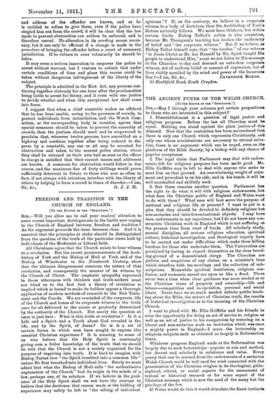FREEDOM &ND TRADITION IN THE CHURCH OF ENGLAND.
[To THE EDITOR OP THE "SPECTATOR."1
SIR,—Will you allow me to call your readers' attention to some recent important developments in the battle now raging in the Church of England between freedom and tradition ? As the argument proceeds the issue becomes clear. And it is essential that the principles at stake should be distinguished from the question of the truth of the particular views held by individuals of the Modernist or Liberal faith.
All Christians agree that the Church exists to bear witness to a revelation. But the recent pronouncements of the Arch- bishop of York and the Bishop of Hull at York, and of the Bishop of Winchester in the Nineteenth Century, show that the ultimate disagreement concerns the nature of that revelation, and consequently the manner of its witness by the Church of Christ. The emphatic sympathy expressed in these utterances with thinkers and truth-seekers must not blind us to the fact that a theory of revelation is implied which is bound to make its holders oppose a thorough application of modern methods of research to the New Testa- ment and the Creeds. We are reminded of the corporate life of the Church and hence of its corporate witness to the truth once for all delivered to the saints or gradually determined by the authority of the Church. But surely the question at issue is just here : What is this truth or revelation P Is it a Life and a Spirit and a Truth about God revealed in the life, and by the Spirit, of Jesus Or is it a set of certain forms in which men have sought to express this essential Christian experienoe ? It is amazing to some of us who believe that the Holy Spirit is continually giving men a fuller knowledge of the truth that we should be told that the Church is not a society organized for the purpose of inquiring into truth. It is hard to imagine with Bishop Talbot how " the Spirit breathed into a common life " unless He first breathed into individual lives. Surely we must admit that what the Bishop of Hull calls " the authoritative explanation of the Church " had its origin in the minds of a few, perhaps one, of its scholars. If we believe in the guid- ance of the Holy Spirit shall we not have the courage to believe that the doctrines that reason made at the bidding of experience may safely be left to "the sifting of individual
opinions "P If, on the contrary, we believe in a corporate witness to a body of doctrines, then the Archbishop of York'■ dictum naturally follows. We must have thinkers, but within certain limits. Bishop Talbot's action is also consistent, because Mr. Thompson's teaching has broken the uniformity of belief and "the corporate witness." But if we believe, as Bishop Talbot himself says, that " the burden " of our witness " is Jesus Christ as He has Himself by His Spirit taught His people to understand Him," must we not listen to His message to the Churches to-day and demand an unbroken corporate witness, not of uniform belief or manner of expression, but of lives visibly moulded by the mind and power of the Incarnate
Sou ?--I am, Sir, &c., CAVENDISH MOXON. 82 Heathfield Road, South Croydon.


















































 Previous page
Previous page